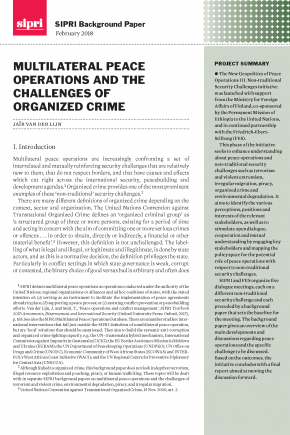Multilateral Peace Operations and the Challenges of Organized Crime
Multilateral peace operations are increasingly confronting a set of interrelated and mutually reinforcing security challenges that are relatively new to them, that do not respect borders, and that have causes and effects which cut right across the international security, peacebuilding and development agendas. As a result, the New Geopolitics of Peace Operations III: Non‑Traditional Security Challenges initiative seeks to enhance understanding about peace operations and non-traditional security challenges such as terrorism and violent extremism, irregular migration, piracy, organized crime and environmental degradation. As a part of this initiative, this SIPRI Background Paper explores the ‘non-traditional’ security challenges that organized crime presents to multilateral peace operations.
The challenges of organized crime may be of direct or indirect relevance to multilateral peace operations. Directly, it may behave as a spoiler or evade peace processes. Indirectly, it may decrease the effectiveness of peace operations, particularly long term, contributing to the continued fragility of countries and their peace processes in its role as partner. Based on this understanding, this SIPRI Background Paper explores the role that peace operations play in preventing and combating organized crime, particularly in weak or collapsed states.
The New Geopolitics of Peace Operations III: Non‑Traditional Security Challenges initiative was launched with support from the Ministry for Foreign Affairs of Finland, co-sponsored by the Permanent Mission of Ethiopia to the United Nations, and in continued partnership with the Friedrich-Ebert-Stiftung (FES).
I. Introduction
II. Peace operations and combating organized crime
III. Examples of peace operations that have engaged in combating organized crime
IV. Peace operations, combating organized crime: Potential implications
V. Cooperation and coordination
VI. Conclusions

